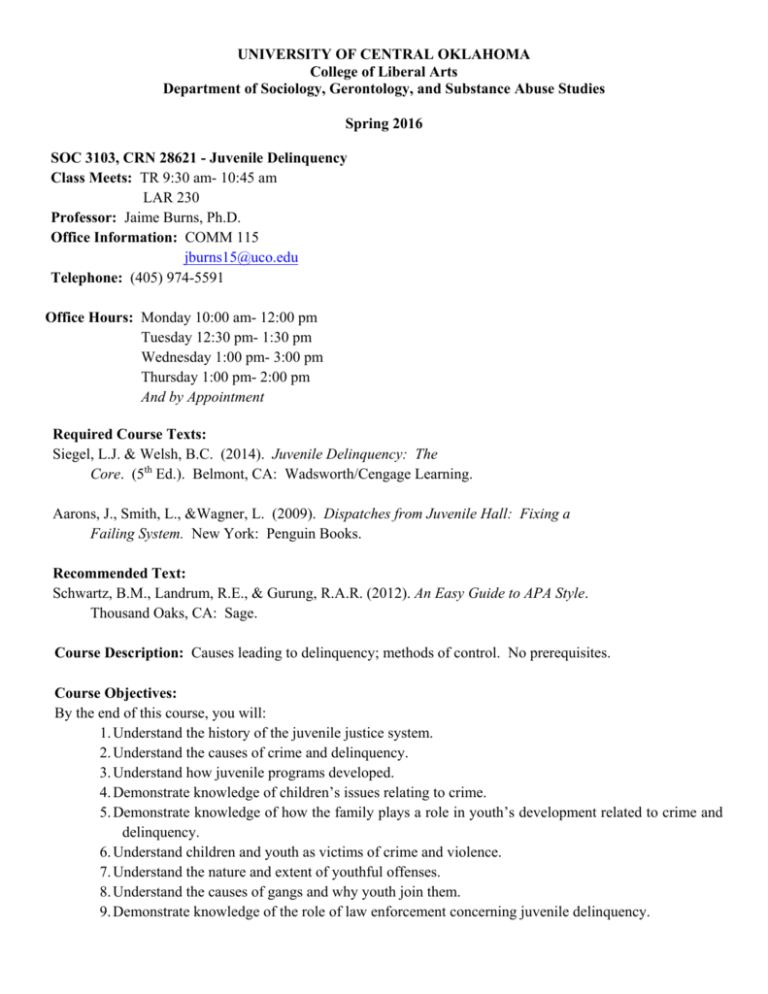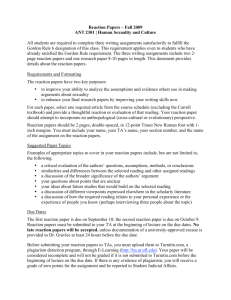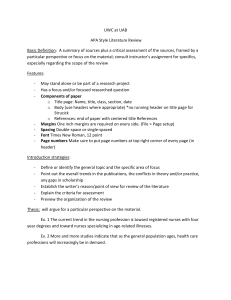SOC3103-28621-Spr16-JuvenileDelinquency
advertisement

UNIVERSITY OF CENTRAL OKLAHOMA College of Liberal Arts Department of Sociology, Gerontology, and Substance Abuse Studies Spring 2016 SOC 3103, CRN 28621 - Juvenile Delinquency Class Meets: TR 9:30 am- 10:45 am LAR 230 Professor: Jaime Burns, Ph.D. Office Information: COMM 115 jburns15@uco.edu Telephone: (405) 974-5591 Office Hours: Monday 10:00 am- 12:00 pm Tuesday 12:30 pm- 1:30 pm Wednesday 1:00 pm- 3:00 pm Thursday 1:00 pm- 2:00 pm And by Appointment Required Course Texts: Siegel, L.J. & Welsh, B.C. (2014). Juvenile Delinquency: The Core. (5th Ed.). Belmont, CA: Wadsworth/Cengage Learning. Aarons, J., Smith, L., &Wagner, L. (2009). Dispatches from Juvenile Hall: Fixing a Failing System. New York: Penguin Books. Recommended Text: Schwartz, B.M., Landrum, R.E., & Gurung, R.A.R. (2012). An Easy Guide to APA Style. Thousand Oaks, CA: Sage. Course Description: Causes leading to delinquency; methods of control. No prerequisites. Course Objectives: By the end of this course, you will: 1. Understand the history of the juvenile justice system. 2. Understand the causes of crime and delinquency. 3. Understand how juvenile programs developed. 4. Demonstrate knowledge of children’s issues relating to crime. 5. Demonstrate knowledge of how the family plays a role in youth’s development related to crime and delinquency. 6. Understand children and youth as victims of crime and violence. 7. Understand the nature and extent of youthful offenses. 8. Understand the causes of gangs and why youth join them. 9. Demonstrate knowledge of the role of law enforcement concerning juvenile delinquency. Tentative Course Outline January 12- Introduction to Course January 14- Read PP. 2-14 January 19- Read PP. 14-28 January 21- Read PP. 32-44 (Applying Ch. 1 Due) January 26- Read PP. 44-55 (Dispatches Introduction and PP. 3-28) January 28- Read PP. 299-312 (Applying Ch. 2 Due) February 2- Read PP. 313-323 (Dispatches PP. 29-52) February 4- Read PP. 349-368 (Applying Ch. 11 Due) February 9- Read PP. 368-378 (Applying Ch. 13 Due) (Dispatches PP. 53-74) February 11- Exam #1 (Chapters 1,2,11, and 13) February 16- Read PP. 59-71 (Dispatches PP. 75-106) February 18- Read PP. 72-80 February 23- Read PP. 81-92 (Dispatches PP. 107-138) February 25- Read PP. 96- 106 (Applying Ch. 3 Due) March 1- Read PP. 107-115 March 3- Read PP. 116-124 (Dispatches PP. 139-158) March 8- (Applying Ch. 4 Due) March 10- Exam #2 (Chapters 3 and 4) March 15 and 17- No Class; Spring Break March 22- Read PP. 156-170 March 24- Read PP. 171-177 (Applying Ch. 6 Due) March 29- Read PP. 181-192 (Dispatches PP. 159-174) March 31- Read PP. 193-206 (Applying Ch. 7 Due) April 5- Read PP. 211-217 April 7- Read PP. 217-230 April 12- Read PP. 230-237 (Dispatches PP. 175-182) April 14- (Applying Ch. 8 Due) April 19- Group Presentations April 21- Group Presentations April 26- Group Presentations April 28May 3- Final Exam: 9:00 am- 10:50 am COURSE EXPECTATIONS: **Exams** There will be three 100-point exams (including the final exam), which will consist of multiple choice and short answer questions. Tests will cover materials from the class lectures, films, the text, and any guest lecturers who may have attended class. Any missed exam must be made up on April 29, 2016. All make-up exams (regardless of the reason you missed the exam) will be in essay format. April 29, 2016 is the only date you may make up the missed exam. **Dispatches from Juvenile Hall Quizzes** There will be eight (8) quizzes over the book Dispatches from Juvenile Hall: Fixing a Failing System. Each quiz is worth twenty (20) points. The day of the quizzes are noted in italics on the course outline. We will be having these quizzes at the beginning of class so it is imperative you come to class on time. You will be able to have one 4X6 notecard for each quiz to make any notes from the chapters as you please. You will not be able to make up these quizzes. If you know prior to missing a class you will not be in attendance, you may have the option of taking the quiz prior to that absence, but not after. I will drop your lowest quiz score. The total point value for the Dispatches from Juvenile Hall quizzes is 140. **Applying What You Have Learned Review Questions** As students complete each chapter, there is an “Applying What You Have Learned” section following each chapter. Students will complete two (2) of these throughout the semester. The due dates for each are noted in the course outline. These are worth 50 points each. Once the due date for that particular chapter has passed, you may not turn it in for that chapter. In other words, you may select which two you want to complete as long as it is submitted by the due date. Each “Applying What You Have Learned” assignment is due at the beginning of class. Furthermore, please see the grading rubric at the bottom of this syllabus! Students can earn five (5) bonus points per paper if they can show proof they used the Writing Center or Tutor.com for their papers. If these services are used, I fully expect minimal spelling/grammar errors. **Group Video Tape Interview- Presentation** At the beginning of the semester you will be developing working groups in order to conduct an interview with a professional working in the field of Juvenile Justice (students can decide which professional occupations they want to select from, but there will be fairly even group members in each group). These videos will be presented to the entire class. After the video is presented, students will be responsible for asking the group questions about the specific profession (students will come prepared with questions they want to have answered about the profession). Students will be individually and peer-graded by their groupmates as well as by the professor. Points will be awarded based upon: quality of the questions asked to the professional, answers given to the class, and your participation within the group. This assignment is worth 100 points. We will decide, as a class, how we want to divide up into groups and when an appropriate time in the semester would be to present each video. **Attendance/Participation** Class attendance and participation are expected and mandatory. I take roll at the beginning of class. You may miss three classes without penalty. Any absence after the third, there will be ten points deduced from your overall points (for each absence). Please note that I also take off points for tardiness. If you are 10 minutes late to classyou are tardy. Two tardy marks equals one absence. You are expected to arrive in class on time and not to leave early. With the exception of an emergency, you should let me know ahead of time if you must leave class early (either via email or in person prior to class). I encourage all class members to participate actively in class discussion, but talking to others during class lecture or discussion, reading the newspaper, sleeping, writing letters, and completing outside assignments are disruptive and, therefore, not acceptable. You MUST turn off or mute all cell phones and pagers. DO NOT TEXT MESSAGE IN THIS CLASS!! If you bring a laptop to class, do NOT watch movies, do Facebook, etc. I will ask you to leave class. Your observance of these guidelines is expected and appreciated. Grading Criteria Three examinations Dispatches quizzes Applying/Learned Interview Total 300 points 140 points 100 points 100 points 640 points A 576-640 B 512-575 C 448-511 D 384-447 F 383 and below Transformational Learning: Transformative learning goals (the “Central Six”) have been identified as: Discipline Knowledge Leadership; Problem Solving (Research, Scholarly and Creative Activities); Service Learning and Civic Engagement; Global and Cultural Competencies; and Health and Wellness. This course addresses four of the university’s transformative learning goals: Discipline knowledge to learn about the history and makeup of the juvenile justice system as well as theories of juvenile offending; leadership skills of what it takes to make an effective leader when working with juveniles; problem solving those issues when working with juveniles; and health and wellness of employees (particularly with stress) when dealing with kids who may also have mental illness. ADA Statement: The University of Central Oklahoma complies with Section 504 of the Rehabilitation Act of 1973 and the Americans with Disabilities Act of 1990. Students with disabilities who need special accommodations must make their requests by contacting Disability Support Services, at (405) 974-2516. The DSS office is located in the Nigh University Center, Room 309. Students should also notify the instructor of special accommodation needs by the end of the first week of class. Turnitin.com UCO subscribes to the Turnitin.com plagiarism prevention service. Students agree that by taking this course, all required assignments may be subject to submission for textual similarity review to Turnitin.com for the detection of plagiarism. All submitted assignment will be included as source documents in the Turnitin.com restricted access reference database for the purpose of detecting plagiarism of such assignments. Use of the Turnitin.com service is subject to the Terms and Conditions of Use posted on the Turnitin.com website. Turnitin.com is just one of various plagiarism prevention tools and methods which may be utilized by your faculty instructor during the terms of the semesters. In the UCO Student Handbook, there is a process for contesting any plagiarism allegations against you. UCO Policies: Please refer to: http://www.uco.edu/academic-affairs/files/aa forms/faculty/StudentInfoSheet.pdf This information includes: a. Academic Integrity Statement b. Uconnect Statement c. ADA Statement d. Incomplete Grade e. Withdrawing from all classes f. Emergency Individual Class Drop or Complete Withdrawal g. Important Dates h. Semester Holidays i. Library Hours j. Weather Related Information k. Emergencies During Finals Statement l. Final Exam Daily Limits m. How to Contact a Faculty Member n. Class Attendance o. Oklahoma State Board of Regents Expectations p. Helpful Numbers q. Course Evaluations Changes in the Course Syllabus: I reserve the right to adjust course requirements, schedule, and syllabus if needed. I will let you know if changes are needed. Rubric for “Applying What You Have Learned” Essays Criteria Spelling and Grammar Creativity/ Originality Unacceptable (0 points) There were many spelling, grammatical, and punctuation errors throughout the paper which significantly impacted the readability. Student did not contribute anything original to the discussion. Content Student did not relate the essay to the questions being asked. Relevant Information Student did not quote or paraphrase from the text at all. APA Formatting Student did not use APA formatting. Acceptable (1-4 points) There were several (more than 4) spelling, grammatical, and punctuation errors throughout the paper. Good (5-9 points) There were only 13 spelling, grammatical, and punctuation errors throughout the paper. Excellent (10 points) There were no spelling, grammatical, and punctuation errors throughout the paper. Minimal Several good Student excelled in creativity/originality distinctions were making clear to the discussion. made where there distinctions with Not many clear were clear ideas the material. Was concepts being being formulated. able to think discussed. outside the box. Student only Student answered Student answered adequately all questions being all questions being answered one of the asked, but did not asked and did a questions being relate it to anything superb job at asked. Did not from the chapter. relating it to really relate it to the information from chapter. the chapter. Student only quoted Student quoted or Student quoted or or paraphrased one paraphrased paraphrased time and it did not multiple times but multiple times and really relate to what it did not related it well to the was being completely relate to questions being discussed. the questions being asked. asked. Student used APA Student used APA Student used APA formatting only formatting formatting correctly sporadically. throughout most of throughout the the paper but still entire paper. had some errors. ** Please note that APA formatting includes in-text citations as well as bibliographic format**

